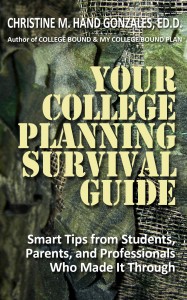Ebook or paperback – which is your preference? More and more people are turning to electronic versions of books for their reading pleasure. This week over 1,000 people downloaded “Your College Planning Survival Guide: Smart Tips From Students, Parents, and Professionals Who Made It Through.” I hope they found it enlightening and useful. Reviews indicate the information offered in this guide equate to having a professional college counseling consultant at your fingertips – it answers all your questions regards to college planning process.
Planning Survival Guide: Smart Tips From Students, Parents, and Professionals Who Made It Through.” I hope they found it enlightening and useful. Reviews indicate the information offered in this guide equate to having a professional college counseling consultant at your fingertips – it answers all your questions regards to college planning process.
Amazon ranks this Kindle eBook edition #1 in “Educational Reference” category for “High School” and “Parent Participation.” If you are one of the thousand plus readers, please offer a review on Amazon if you found it helpful and share your knowledge!
For those that still prefer holding a book in your hands, highlighting the important tips, and making notes to yourself in the margins, you will find this book is also available in paperback. Happy Reading!
Link to Amazon books – click here! Also available in paperback!









